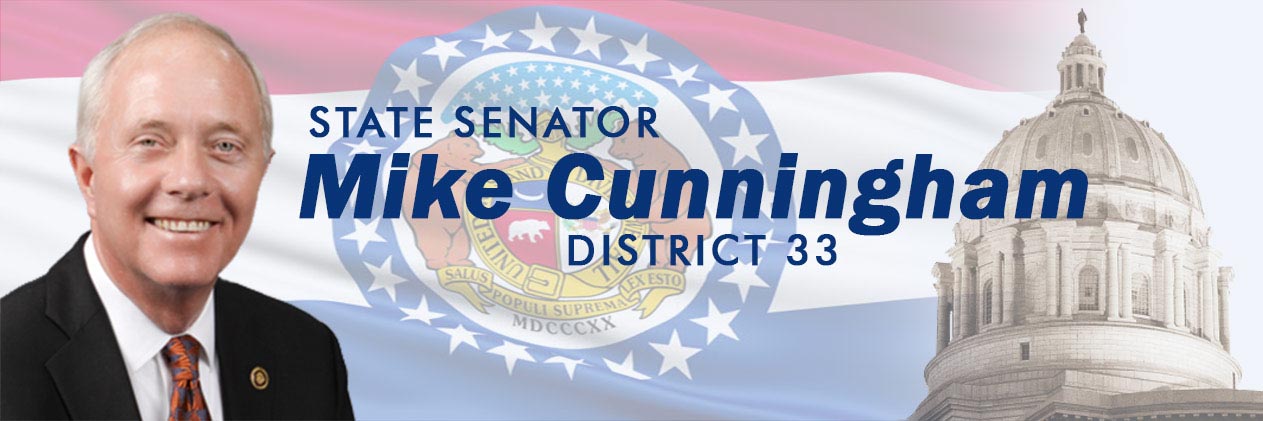
Legislative Column for April 25, 2019
Your Missouri state government will spend about $30 billion next year. That’s the bottom line from the work carried out in the Missouri Senate in recent days. With less than a month left in the 2019 legislative session, we’ve turned our attention to passing the state budget.
By law, the process of developing the state budget begins in the House of Representatives, where lawmakers draft 13 budget bills that authorize spending for the various agencies of state government. The Senate’s review of the House budget proposals begins in the Appropriations Committee, where each bill is discussed and committee members have an opportunity to question the recommendations and suggest alternatives. That work was completed in recent weeks.
Senate substitute versions of those 13 budget bills came before the full Senate this week. Unlike statutory bills, which often inspire extended debate and discussion, the process of approving the budget is relatively purposeful and efficient. Senators were provided an opportunity to ask questions, but there was little posturing or gamesmanship and we passed all 13 bills in just one day.
The $6.2 billion budget for the Department of Elementary and Secondary Education fully funds the school financing formula. The Senate version of the Department of Higher Education’s $1.3 billion budget calls for 13 percent more spending for colleges and other post-secondary education. Part of this increase represents money for workforce development training, a priority for the governor this year.
Just over 10 percent of the Department of Transportation’s budget will be spent on the $301 million bridge improvement project that has been the topic of much debate this legislative session. This work will be financed by bonds. About $50 million will be spent from general revenue to kick-start the bridge initiative.
Working their way through the budget bills, Senators quickly approved budgets for the Office of Administration and the departments of Agriculture, Conservation and Natural Resources with little discussion. The $243 million the Senate earmarked for the Department of Economic Development reflects a 33 percent reduction in that agency’s budget. Restructuring DED was a highlight of the governor’s agenda for 2019 and many of the appropriations for programs once administered by this agencies have been reassigned to other departments.
Every state agency will provide a 3 percent cost-of-living increase for most state employees. Under both the House and Senate budget plans, corrections officers will receive an additional raise, which is intended to slow the rate of turnover among people who work in Missouri’s prisons. The cost of the increased wages for corrections officers will be offset by savings from the consolidation of two northwest Missouri facilities.
Nearly half of the state budget goes to the departments of Mental Health, Health and Senior Services and Social Services. The Department of Social Services, which administers most of Missouri’s Medicaid programs, alone will spend $9.7 billion in 2020. If trends continue, the state of Missouri will see an ever-increasing share of its resources devoted to caring for sick, disabled and aging members of the population.
Any way you look at it, $30 billion is a lot of money. Some members of the Senate feel we’re spending far too much. Others don’t think we spend enough. No matter what we do, there’s always more that could be done. Our job in the Legislature is to do the most we can with the resources we have to work with. It’s definitely a balancing act, as we weigh public needs with the understanding that every dollar we spend comes from taxpayers.
The budget bills the Senate passed now head to the House of Representatives. They will review our substitute proposals and approve some, while rejecting others. We’ll work out the differences in a conference committee. Over the next two weeks, the Legislature will finish the process and send a final budget to the governor for his signature. We will have accomplished the one thing we’re required to do each year. We’ll balance the books.
As always, I appreciate it when groups from around Missouri and from our community back home come to visit me at the Capitol. If you would like to arrange a time to come and visit me in Jefferson City, or if you ever have any questions, please don’t hesitate to contact my Capitol office at (573) 751-1882.
